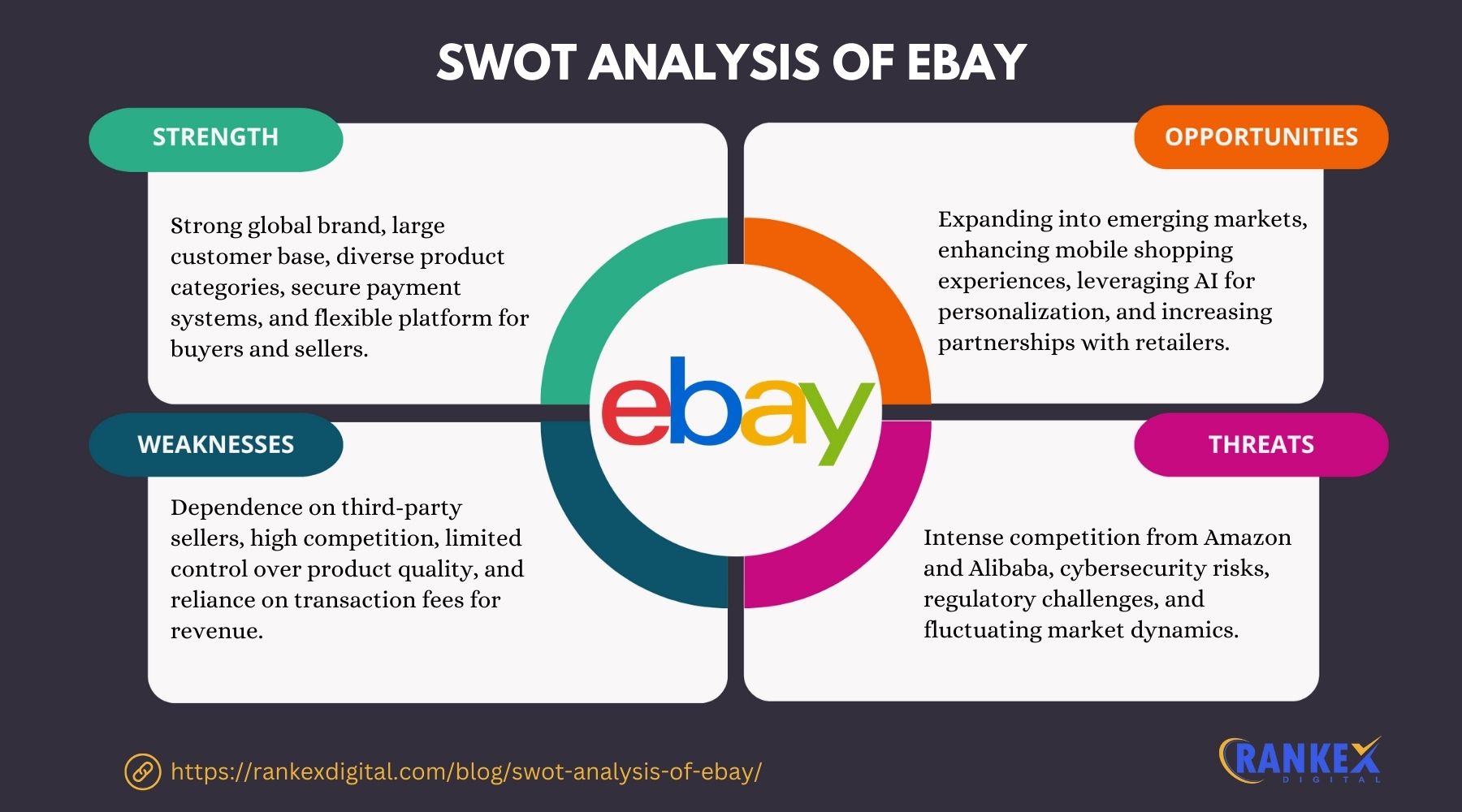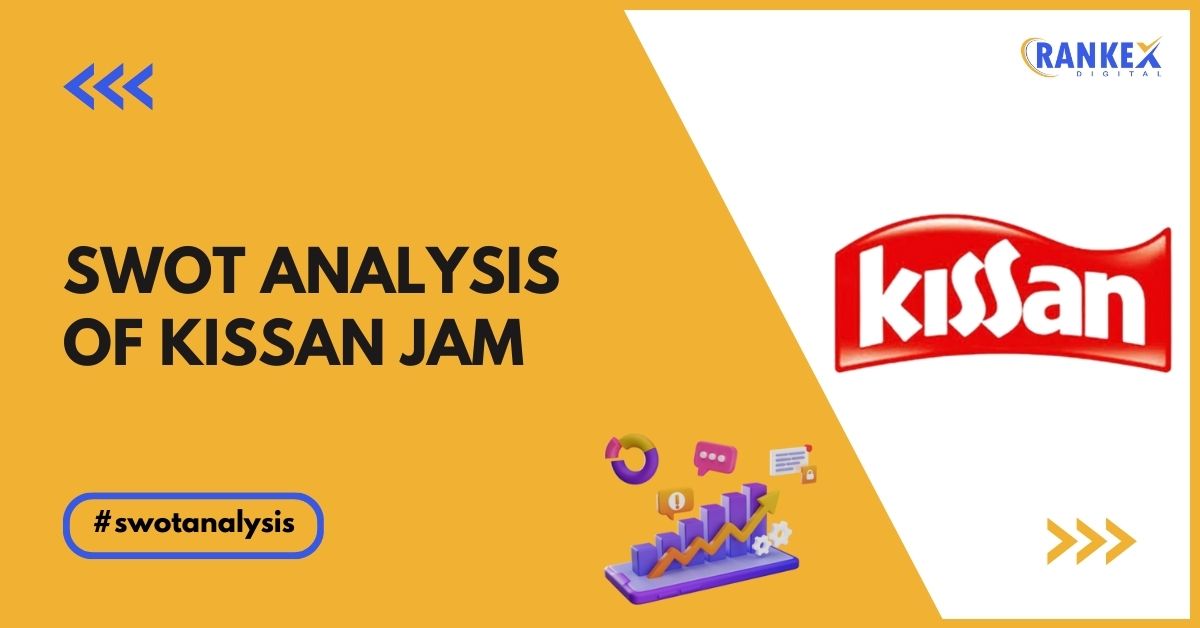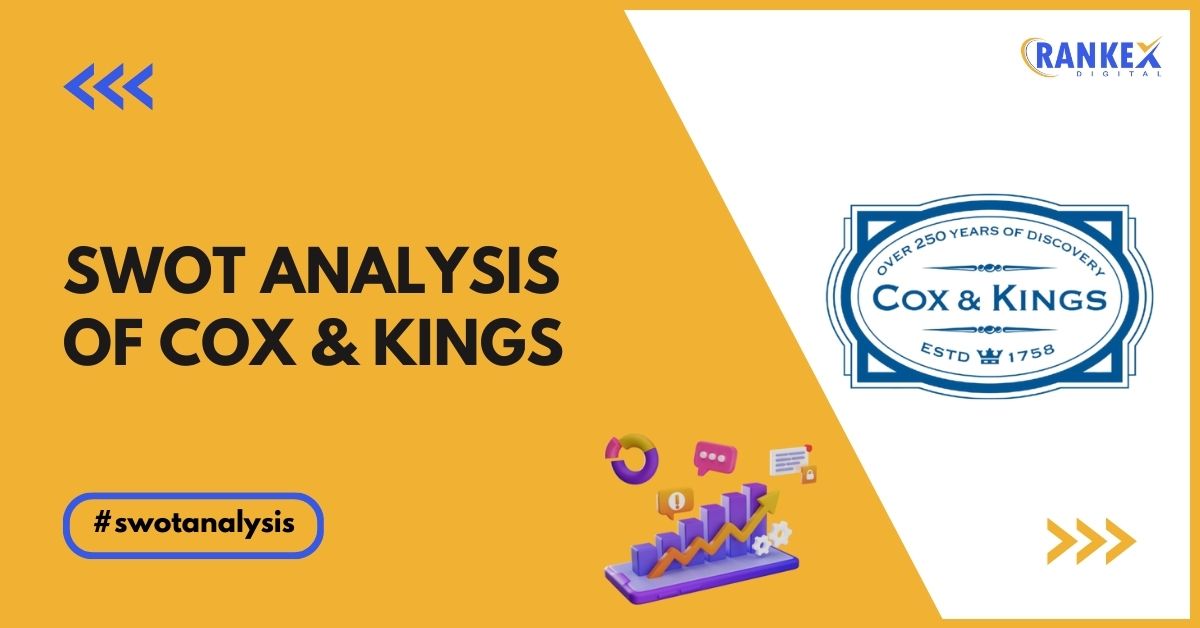eBay, one of the pioneers in the e-commerce sector, remains a key player in online buying and selling. Known for its auction-style listings and wide variety of product categories, eBay has built a significant presence in the global online marketplace.
Conducting a SWOT analysis of eBay provides valuable insights into its strengths, weaknesses, opportunities, and threats, helping us understand its competitive position and future potential.
In this blog
Overview of eBay

Founded in 1995 by Pierre Omidyar, eBay transformed online shopping with its pioneering auction-based platform. Headquartered in San Jose, California, the company operates globally, connecting millions of buyers and sellers. eBay’s strengths lie in its established brand reputation, diverse product categories, and global reach across over 190 countries. Its auction model and tools for seller support set it apart in the e-commerce market.
However, eBay faces challenges, including intense competition from platforms like Amazon and Etsy, issues with counterfeit products, and the declining popularity of auctions. Despite these weaknesses, opportunities exist in expanding to emerging markets, focusing on niche categories, and leveraging technological advancements like AI. eBay’s promotion of sustainability through resale aligns with growing consumer interest in eco-friendly practices.
Threats such as regulatory challenges, economic instability, and customer retention difficulties underscore the need for innovation and strategic partnerships to maintain its competitive edge.
Quick Stats About eBay
| Founder | Pierre Omidyar |
|---|---|
| Year Founded | 1995 |
| Headquarters | San Jose, California, USA |
| Employees | 10,800+ |
| CEO | Jamie Iannone |
| Revenue (2023) | $9.8 Billion |
| Net Income (2023) | $2 Billion |
SWOT Analysis of eBay

Strengths of eBay
- Established Brand Recognition:
eBay has become a household name in e-commerce, with a strong legacy since its inception in 1995. Over the years, it has built significant brand equity by establishing itself as a trusted platform for secure transactions and a vast array of products. Consumers often turn to eBay not only for affordable items but also for rare collectibles, making it a go-to site for both everyday shopping and specialized needs. Its long-standing reputation helps maintain customer loyalty and a strong repeat customer base, ensuring continued success. - Global Reach:
Operating in 190+ countries, eBay’s reach is truly global. This expansive footprint allows sellers to connect with buyers from diverse geographical locations, thus expanding their market potential. eBay’s multilingual and multi-currency capabilities ensure a seamless experience for buyers and sellers worldwide. Sellers benefit from being able to access international markets without the barriers of physical storefronts, and buyers can find rare, location-specific products they might not have access to on local platforms. This global network provides eBay with scalability and solidifies its position as a leading international marketplace. - Diverse Product Categories:
eBay’s product offering spans a wide range of categories, from rare collectibles and vintage items to electronics, fashion, and automotive parts. This vast range appeals to a broad audience with varied interests. Sellers can focus on niche markets, and buyers can find products that may not be available elsewhere. The diversity also shields eBay from overreliance on any single category or consumer trend, helping maintain consistent revenue streams. Moreover, the platform serves both enthusiasts and everyday shoppers, providing a solid foundation for long-term success. - Auction-Style Listings:
The auction model is one of eBay’s core differentiators from other e-commerce platforms. Items that are unique, limited, or hard to find thrive in this environment. Auctions generate excitement and create a competitive atmosphere among buyers, potentially driving up the price of products. This feature is particularly valuable for sellers offering rare collectibles or vintage goods. The unique nature of auctions allows eBay to maintain its brand identity as a platform where people can find special items that they can’t easily find elsewhere. - Strong Seller Support:
eBay provides a variety of tools and resources to support its sellers. Features like Promoted Listings, which allow sellers to increase their visibility, are just one example of how eBay helps sellers succeed. Sellers also have access to analytics that help them track their traffic, sales insights, and market trends, enabling them to optimize their listings for better performance. These features encourage more sellers to use the platform and build successful businesses, which ultimately benefits eBay by increasing listings and fostering a healthy marketplace.
Weaknesses of eBay
- Intense Competition:
eBay faces fierce competition from other major e-commerce platforms like Amazon, which offers faster delivery times, integrated logistics, and a seamless Prime membership experience. While eBay is known for its auction model, competitors like Etsy cater to specialized markets, and Amazon dominates in terms of product variety, faster shipping, and customer convenience. In addition, many online shoppers gravitate toward platforms with lower fees or more personalized services, which makes eBay less competitive in comparison. As a result, eBay must constantly innovate to retain its market share. - Dependence on Seller Activity:
eBay’s marketplace model is highly dependent on a thriving ecosystem of active and satisfied sellers. If sellers become dissatisfied with eBay’s fees, policies, or visibility issues, they may reduce the number of listings or even leave the platform altogether. This would hurt eBay’s revenue streams and its product variety. Seller retention is thus critical to the platform’s success. If eBay fails to keep sellers happy with competitive fees and promotional tools, it risks losing a significant portion of its marketplace. - Fraud and Counterfeit Issues:
While eBay has taken steps to combat fraud by implementing various safeguards and policies, buyers occasionally encounter counterfeit or misrepresented items. These issues can erode trust and discourage buyers from returning to the platform. Repeated incidents of fraud may lead buyers and sellers to migrate to more controlled platforms, where counterfeit items are less of a concern. Thus, ensuring high levels of transaction security is paramount for eBay to maintain user trust. - Declining Auction Popularity:
While auctions were once eBay’s defining feature, the rise of instant purchase options such as Buy It Now has made auction-style listings less popular among many consumers. Buyers are increasingly attracted to platforms that allow for immediate purchasing, especially with the rise of fast shopping trends and next-day deliveries. As consumer preferences shift toward more convenient shopping experiences, eBay’s auction-based model may struggle to retain its relevance in certain categories, especially when compared to platforms offering quick purchases and immediate satisfaction. - Limited Direct Fulfillment Services:
Unlike Amazon, which has a robust Fulfilled by Amazon (FBA) system, eBay lacks a proprietary fulfillment network for its sellers. This results in inconsistent shipping times and potentially lower-quality delivery experiences for buyers. Without a system to manage logistics and fulfillment, eBay struggles to ensure the same smooth, fast shipping that competitors offer. This discrepancy in fulfillment services can create negative buyer experiences, making it harder for eBay to compete against logistics-heavy rivals like Amazon, which guarantee faster, more reliable delivery.
Opportunities for eBay
- Expansion in Emerging Markets:
As internet access and smartphone penetration increase in regions like Asia-Pacific, Africa, and Latin America, eBay has significant growth potential in these markets. Localized payment systems and language-specific product listings would make the platform more accessible to new users in these regions. eBay could introduce region-specific offerings and logistics partnerships to cater to local preferences. As more people in these regions get online, eBay has an opportunity to capture a significant share of new online shoppers, driving revenue growth in emerging markets. - Focus on Niche Categories:
eBay has the opportunity to strengthen its leadership in vintage, collectibles, and rare items markets. By emphasizing its position as the go-to marketplace for unique and hard-to-find products, eBay can build a loyal niche customer base. Collaborating with specialty sellers or even curating exclusive listings could enhance eBay’s reputation as the marketplace for unique finds, attracting collectors and enthusiasts who are less concerned with immediate purchases and more focused on sourcing specific, rare products. - Technological Advancements:
With the rise of artificial intelligence (AI), machine learning, and augmented reality (AR), eBay has the potential to enhance the shopping experience for users. AI can be leveraged for personalized product recommendations, fraud detection, and search optimization, making it easier for buyers to find exactly what they’re looking for. Integrating AR features could also allow users to visualize products before purchase, improving engagement and conversion rates. By staying at the cutting edge of technological advancements, eBay can continue to differentiate itself from competitors. - Sustainability Initiatives:
In response to increasing environmental concerns, eBay can emphasize the growing demand for second-hand goods by aligning itself with the circular economy. The platform’s focus on pre-owned and vintage items already taps into the sustainability movement, and further promoting eco-friendly products can attract environmentally conscious shoppers. Campaigns focused on sustainable shopping can strengthen eBay’s brand image and make it stand out from competitors that focus primarily on new goods. This focus on sustainability can appeal to a new generation of eco-conscious consumers. - Strategic Partnerships:
Forming partnerships with logistics providers can help improve eBay’s shipping times, tracking capabilities, and delivery reliability, addressing a major pain point for customers. By improving its fulfillment infrastructure, eBay could compete more effectively with Amazon and other platforms. Furthermore, partnerships with payment services like PayPal or new fintech companies could further improve transaction security and offer buyers a seamless, secure purchasing experience, attracting more users to the platform.
Threats to eBay
- Intensifying Competition:
eBay faces substantial competition from larger e-commerce platforms like Amazon, which boasts superior logistics, fast delivery options, and Prime membership perks. Additionally, niche marketplaces such as Poshmark (for fashion) or StockX (for sneakers) are drawing specialized audiences away from eBay. With increasing consumer preference for faster shipping and integrated services, eBay must innovate and improve its offerings to maintain its competitive edge. - Economic Downturns:
Economic instability, such as recessions or rising inflation, can negatively impact discretionary spending. In difficult financial times, consumers may cut back on purchases, which could lead to a decline in transactions on eBay. Additionally, sellers may seek out platforms with lower fees or better incentives during economic downturns, weakening eBay’s revenue generation capabilities. - Regulatory Challenges:
As e-commerce grows, eBay faces increasing scrutiny from regulators worldwide. Changes to tax laws (such as VAT adjustments in the EU) or cross-border trade rules could complicate eBay’s operations. Privacy regulations, like the General Data Protection Regulation (GDPR) in Europe, also require compliance. Non-compliance with these regulations could result in fines or loss of user trust, potentially hurting eBay’s global operations.
- Technological Disruptions:
New technologies such as blockchain or AI-driven e-commerce platforms could disrupt the current e-commerce landscape, potentially eroding eBay’s market share. Platforms that use blockchain for secure transactions or that offer more advanced AI-based personalization may appeal to consumers looking for next-gen shopping experiences. If eBay fails to innovate and adopt these emerging technologies, it risks losing relevance to modern competitors. - Customer Retention Challenges:
eBay may struggle with high buyer and seller turnover due to dissatisfaction with platform policies, fees, or service quality. Many buyers and sellers are looking for convenience, low fees, and instant gratification, which competitors like Amazon can provide. Maintaining customer satisfaction and keeping both buyers and sellers loyal is crucial for eBay’s continued success. If eBay cannot balance the needs of its buyers and sellers, its growth potential could be stifled.
Frequently Asked Questions
What is eBay’s biggest strength in the e-commerce industry?
eBay’s global reach and diverse product categories, combined with its unique auction-style listings, give it a competitive edge.
How does eBay compete with platforms like Amazon?
eBay differentiates itself by focusing on peer-to-peer transactions, auctions, and niche markets, offering products that may not be available on Amazon.
What steps is eBay taking to ensure customer safety?
eBay employs advanced fraud detection systems, buyer and seller protection programs, and robust review mechanisms to safeguard users.
How can eBay expand its market presence?
eBay can grow by targeting emerging markets, enhancing its technological capabilities, and focusing on sustainability and niche product categories.
What challenges does eBay face in retaining users?
Intense competition, counterfeit issues, and the declining popularity of auctions are key challenges in retaining both buyers and sellers.
Conclusion
eBay’s SWOT analysis highlights its strengths as a global leader with a unique business model and significant market presence. While it faces challenges such as stiff competition and regulatory hurdles, the opportunities in emerging markets, technological advancements, and sustainability initiatives offer significant potential for growth.
By leveraging its strengths and addressing weaknesses, eBay can continue to innovate and remain a prominent player in the e-commerce industry.











